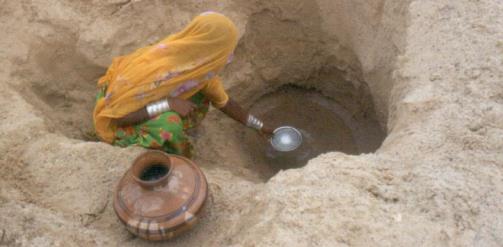As it stands, 1.8 billion people use a source of drinking water contaminated with faeces (pdf), putting them at risk of contracting cholera, dysentery, typhoid and polio, yet over 80% of the wastewater generated by society flows back into the ecosystem without being treated or reused (pdf). On World Water Day, there is an urgent call for the global community to stop water waste and focus efforts on improving water quality.

While much of the debate on water quality has been very technical focusing on microbiology and environmental engineering, IDS and the ESRC STEPS Centre have tried to inject social science perspectives on these critical issues. In particular, work on peri-urban areas has focused on how the poor and marginalised tend to risk more and how standards can easily be flouted in such unregulated spaces.
Interdisciplinary research on transforming waste in peri-urban environments has focused on developing a socio-technical approach to create technologies that can turn human waste into a resource whilst also reducing water contamination.
Over and above this work on waste and quality, at IDS much of our focus is on the politics of access, use and control of resources, where water is particularly at the heart.
The ‘food, energy and water’ nexus
IDS researchers and partners argue that alongside politics, control and access, water is deeply intertwined with issues of food, energy, and the environment. The STEPS Centre is a lead partner in The Nexus Network, an ESRC-funded initiative which brings together researchers, policymakers, business leaders and civil society to improve decision making on food, energy, water and the environment.
Also highlighted by a major report on water for food security and nutrition (pdf), launched by the high-level panel of experts on food security and nutrition (HLPE), which was the first comprehensive effort to bring together access to water, food security and nutrition. This report went far beyond the usual focus on water for agriculture and highlighted that without ensuring universal access to water, there can be no food security.
Linking power and inequality to the water crisis
In turn, water and sanitation for all provided in an equitable and sustainable way is central to global justice for poor women and men. Yet, despite successive global declarations and efforts, hundreds of millions still suffer from lack of access. Simplistic portrayals of water and sanitation ‘crises’ have often led to misunderstandings on the nature of the problem and how to address it. The result has been a failure to centralise the needs and interests of the poor and marginalised within different solutions. IDS’ research with the Water Justice Programme works to seek sustainable and equitable solutions.
In the recent IDS Bulletin on Power, Poverty and Inequality, IDS researcher Lyla Mehta argued in her article: ‘Why Invisible Power and Structural Violence Persist in the Water Domain‘, that inequality in access to water and sanitation is largely caused and legitimised by different forms of invisible power that prevent universal access. It shows how invisible power combined with structural violence and experiences of unequal citizenship result in dismal access to water that cause systematic harm to poor and marginalised women and men.
These persistent inequalities are set amongst a backdrop of climate change, which create an unprecedented level of uncertainties. Uncertainty has emerged as a problem for scientists and policymakers alike in climate change decision-making. IDS researchers note that even the understanding of uncertainty in climate change has been narrowly conceptualised from above (by scientists, experts and decision-makers). In doing so, the day-to-day experiences and practices of local people around uncertainty have been ignored, resulting in flawed actions.
Managing water resources?
In drawing comparisons between the Taiwanese and Californian water crises, IDS researcher Jeremy Allouche argued “while it would be unreasonable to refute the fact climate change will have an important impact on water resources with a higher risk of flooding and more frequent droughts, it may be unwise to place these two specific crises as just an illustration of this trend. Indeed, these crises need to be understood as context specific and perhaps more importantly as representing historical legacies of bad management practices and policy choices”.
‘How water became a casualty of Mozambique’s debt crisis’ and ‘From remunicipalisation to reprivatisation of water? The case of Mozambique’, STEPS centre blogs, both highlight the unique context for Mozambique and its water resource management and the subsequent challenges.
As World Water Day focuses particularly on wastewater, there needs to be a strong understanding of the implications and impact of managing resources fairly, and the context that this is within. This point is made in Special Issue of Water Alternatives on ‘Flows and practices: The politics of Integrated Water Resources Management (IWRM) in southern Africa’, arguing for the need for a wider and fairer distribution of water resources for diverse livelihoods rather than a concentration in the hands of large-scale users.